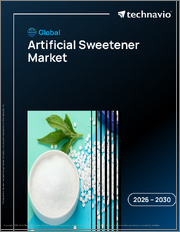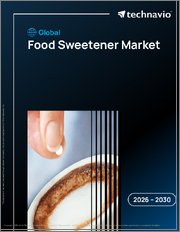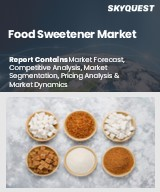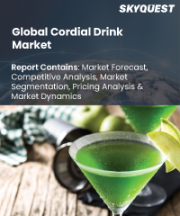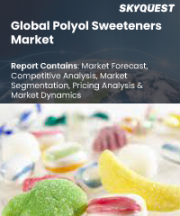
|
시장보고서
상품코드
1677869
감미료 시장 규모, 점유율, 성장 분석 : 제품 유형별, 유형별, 형태별, 유통 채널별, 용도별, 최종사용자별, 지역별 - 산업 예측(2025-2032년)Sweeteners Market Size, Share, and Growth Analysis, By Product Type (Sucrose, Starch Sweeteners and Sugar Alcohol), By Type (Natural, Artificial), By Form, By Distribution Channel, By Application, By End User, By Region - Industry Forecast 2025-2032 |
||||||
감미료 시장 규모는 2023년에 1,404억 달러로 평가되며, 2024년 1,454억 5,000만 달러에서 2032년에는 1,930억 2,000만 달러로 성장하며, 예측 기간 중(2025-2032년) CAGR은 3.6%로 성장할 전망입니다.
감미료 시장은 전 세계에서 건강에 대한 관심이 높아지고 영양이 풍부한 식품으로의 전환으로 인해 크게 성장하고 있습니다. 이러한 추세는 꿀과 인공 감미료에 대한 선호도 증가로 이어져 천연 제품에 대한 소비자 수요를 반영하고 있습니다. 미국 농무부의 분석에 따르면 대체 감미료와 식물성 감미료의 인기는 2021년 설탕 소비의 정체에 기여할 것이며, New Nutrition Business의 조사에 따르면 유럽인의 3분의 2가 설탕 섭취를 줄이려고 노력하고 있는 것으로 나타났습니다. 또한 빠르게 변화하는 라이프스타일에 힘입은 간편식 붐은 식품 가공 부문의 중요한 원동력이 될 것으로 보입니다. 미국에서는 특히 탄산음료 소비 증가로 인해 감미료에 대한 수요가 증가할 것으로 예상됩니다.
목차
서론
- 조사의 목적
- 조사 범위
- 정의
조사 방법
- 정보 조달
- 2차와 1차 데이터 방법
- 시장 규모 예측
- 시장의 전제조건과 제한
개요
- 세계 시장 전망
- 공급과 수요 동향 분석
- 부문별 기회 분석
시장 역학과 전망
- 시장 개요
- 시장 규모
- 시장 역학
- 촉진요인과 기회
- 억제요인과 과제
- Porter의 산업 분석
주요 시장 인사이트
- 주요 성공 요인
- 경쟁의 정도
- 주요 투자 기회
- 시장 에코시스템
- 시장의 매력 지수(2024년)
- PESTEL 분석
- 거시경제 지표
- 밸류체인 분석
- 가격 분석
- 규제 상황
- 사례 연구
- 무역 분석
- 고객과 구매 기준 분석
- 원재료의 분석
감미료 시장 규모 : 제품 유형별 & CAGR(2025-2032)
- 시장 개요
- 수크로스
- 전분 감미료와 당 알코올
- 고강도 감미료
감미료 시장 규모 : 유형별 & CAGR(2025-2032)
- 시장 개요
- 천연
- 인공
감미료 시장 규모 : 형태별 & CAGR(2025-2032)
- 시장 개요
- 고체
- 액체
- 분말
감미료 시장 규모 : 유통 채널별 & CAGR(2025-2032)
- 시장 개요
- 슈퍼마켓과 하이퍼마켓
- 백화점
- 편의점
- 온라인 스토어
- 기타
감미료 시장 규모 : 용도별 & CAGR(2025-2032)
- 시장 개요
- 제과
- 탁상 감미료
- 베이커리와 시리얼
- 음료
- 유제품
- 가공식품
- 기타
감미료 시장 규모 : 최종사용자별 & CAGR(2025-2032)
- 시장 개요
- 기업용
- B2C
감미료 시장 규모 : 지역별 & CAGR(2025-2032)
- 북미
- 미국
- 캐나다
- 유럽
- 독일
- 스페인
- 프랑스
- 영국
- 이탈리아
- 기타 유럽 지역
- 아시아태평양
- 중국
- 인도
- 일본
- 한국
- 기타 아시아태평양
- 라틴아메리카
- 브라질
- 기타 라틴아메리카 지역
- 중동 및 아프리카
- GCC 국가
- 남아프리카공화국
- 기타 중동 및 아프리카
경쟁 정보
- 상위 5사의 비교
- 주요 기업의 시장 포지셔닝(2024년)
- 주요 시장 기업이 채택한 전략
- 최근 시장 동향
- 기업의 시장 점유율 분석(2024년)
- 주요 기업의 기업 개요
- 기업의 상세
- 제품 포트폴리오 분석
- 기업의 부문별 점유율 분석
- 매출의 전년대비 비교(2022-2024)
주요 기업 개요
- Tate & Lyle PLC(United Kingdom)
- Cargill, Incorporated(United States)
- Roquette Freres S.A.(France)
- E. I. du Pont de Nemours and Company(United States)
- Archer Daniels Midland Company(United States)
- Ajinomoto Co., Inc.(Japan)
- Ingredion Incorporated(United States)
- JK Sucralose Inc.(China)
- Tereos S.A.(France)
- Sudzucker AG(Germany)
- Symrise AG(Germany)
- Givaudan S.A.(Switzerland)
- Agrana Beteiligungs-AG(Austria)
- Mitsui & Co., Ltd.(Japan)
- Danisco A/S(Denmark)
- Celanese Corporation(United States)
- Zydus Wellness Ltd.(India)
- GLG Life Tech Corporation(Canada)
결론과 제안
KSA 25.04.22Sweeteners Market size was valued at USD 140.4 billion in 2023 and is poised to grow from USD 145.45 billion in 2024 to USD 193.02 billion by 2032, growing at a CAGR of 3.6% during the forecast period (2025-2032).
The sweeteners market is experiencing significant growth driven by increasing health consciousness and a shift towards nutrient-dense food options globally. This trend has led to a rising preference for honey and artificial sweeteners, reflecting consumer demand for natural products. According to a USDA analysis, the popularity of alternative sweeteners and plant-based options contributed to a plateau in sugar consumption in 2021, with a New Nutrition Business survey revealing that two-thirds of Europeans aimed to reduce their sugar intake. Furthermore, the convenience food boom, driven by fast-paced lifestyles, is positioned to be a key driver for the food processing sector. In the US, the demand for sweeteners is expected to grow, particularly due to the increasing consumption of carbonated soft drinks.
Top-down and bottom-up approaches were used to estimate and validate the size of the Sweeteners market and to estimate the size of various other dependent submarkets. The research methodology used to estimate the market size includes the following details: The key players in the market were identified through secondary research, and their market shares in the respective regions were determined through primary and secondary research. This entire procedure includes the study of the annual and financial reports of the top market players and extensive interviews for key insights from industry leaders such as CEOs, VPs, directors, and marketing executives. All percentage shares split, and breakdowns were determined using secondary sources and verified through Primary sources. All possible parameters that affect the markets covered in this research study have been accounted for, viewed in extensive detail, verified through primary research, and analyzed to get the final quantitative and qualitative data.
Sweeteners Market Segments Analysis
Global Sweeteners Market is segmented by Product Type, Type, Form, Distribution Channel, Application, End User and region. Based on Product Type, the market is segmented into Sucrose, Starch Sweeteners and Sugar Alcohol and High Intensity Sweeteners. Based on Type, the market is segmented into Natural and Artificial. Based on Form, the market is segmented into Solid, Liquid and Powder. Based on Distribution Channel, the market is segmented into Supermarket and Hypermarkets, Departmental Stores, Convenience Stores, Online Store and Others. Based on Application, the market is segmented into Confectionery, Table Top Sweetener, Bakery and Cereal, Beverages, Dairy, Processed food and Others. Based on End User, the market is segmented into B2B and B2C. Based on region, the market is segmented into North America, Europe, Asia Pacific, Latin America and Middle East & Africa.
Driver of the Sweeteners Market
As awareness of the adverse health effects of sugar continues to rise, consumers are increasingly searching for low-calorie and sugar-free alternatives, driving the demand for sweeteners. In response, manufacturers are launching a variety of innovative sweetening options, including stevia, monk fruit extract, and erythritol. Numerous studies have established a connection between high sugar intake and various health issues, such as obesity, type 2 diabetes, heart disease, and other chronic ailments. Consequently, a growing segment of the population is turning to alternatives to conventional sugar, fueling significant growth in the sweeteners market and reshaping consumer preferences.
Restraints in the Sweeteners Market
A significant limitation facing the global sweeteners market is the restricted availability of raw materials. Certain natural sweeteners, including stevia and monk fruit extract, necessitate particular growing conditions, resulting in their limited supply. This scarcity can create supply chain challenges, potentially leading to increased prices and reduced access to these sweetener options in the market. Consequently, manufacturers and consumers may find it difficult to source these natural alternatives, ultimately constraining market growth and influencing pricing dynamics within the sweeteners sector. Addressing these availability issues will be essential for fostering a more robust sweeteners market in the future.
Market Trends of the Sweeteners Market
The sweeteners market is witnessing a significant trend towards natural alternatives, driven by an increasing consumer preference for healthier and more natural food options. As awareness of health and wellness grows, natural sweeteners such as stevia, monk fruit extract, and allulose are emerging as popular choices due to their low-calorie content and low glycaemic index, appealing to health-conscious consumers and those seeking to reduce sugar intake. This shift not only aligns with the broader trend towards clean label products but also reflects changing dietary patterns, indicating a robust market potential for natural sweeteners as consumers prioritize quality and wellness in their food choices.
Table of Contents
Introduction
- Objectives of the Study
- Scope of the Report
- Definitions
Research Methodology
- Information Procurement
- Secondary & Primary Data Methods
- Market Size Estimation
- Market Assumptions & Limitations
Executive Summary
- Global Market Outlook
- Supply & Demand Trend Analysis
- Segmental Opportunity Analysis
Market Dynamics & Outlook
- Market Overview
- Market Size
- Market Dynamics
- Drivers & Opportunities
- Restraints & Challenges
- Porters Analysis
- Competitive rivalry
- Threat of substitute
- Bargaining power of buyers
- Threat of new entrants
- Bargaining power of suppliers
Key Market Insights
- Key Success Factors
- Degree of Competition
- Top Investment Pockets
- Market Ecosystem
- Market Attractiveness Index, 2024
- PESTEL Analysis
- Macro-Economic Indicators
- Value Chain Analysis
- Pricing Analysis
- Regulatory Landscape
- Case Studies
- Trade Analysis
- Customer & Buying Criteria Analysis
- Raw Material Analysis
Global Sweeteners Market Size by Product Type & CAGR (2025-2032)
- Market Overview
- Sucrose
- Starch Sweeteners and Sugar Alcohol
- High Intensity Sweeteners
Global Sweeteners Market Size by Type & CAGR (2025-2032)
- Market Overview
- Natural
- Artificial
Global Sweeteners Market Size by Form & CAGR (2025-2032)
- Market Overview
- Solid
- Liquid
- Powder
Global Sweeteners Market Size by Distribution Channel & CAGR (2025-2032)
- Market Overview
- Supermarket and Hypermarkets
- Departmental Stores
- Convenience Stores
- Online Store
- Others
Global Sweeteners Market Size by Application & CAGR (2025-2032)
- Market Overview
- Confectionery
- Table Top Sweetener
- Bakery and Cereal
- Beverages
- Dairy
- Processed food
- Others
Global Sweeteners Market Size by End User & CAGR (2025-2032)
- Market Overview
- B2B
- B2C
Global Sweeteners Market Size & CAGR (2025-2032)
- North America (Product Type, Type, Form, Distribution Channel, Application, End User)
- US
- Canada
- Europe (Product Type, Type, Form, Distribution Channel, Application, End User)
- Germany
- Spain
- France
- UK
- Italy
- Rest of Europe
- Asia Pacific (Product Type, Type, Form, Distribution Channel, Application, End User)
- China
- India
- Japan
- South Korea
- Rest of Asia-Pacific
- Latin America (Product Type, Type, Form, Distribution Channel, Application, End User)
- Brazil
- Rest of Latin America
- Middle East & Africa (Product Type, Type, Form, Distribution Channel, Application, End User)
- GCC Countries
- South Africa
- Rest of Middle East & Africa
Competitive Intelligence
- Top 5 Player Comparison
- Market Positioning of Key Players, 2024
- Strategies Adopted by Key Market Players
- Recent Developments in the Market
- Company Market Share Analysis, 2024
- Company Profiles of All Key Players
- Company Details
- Product Portfolio Analysis
- Company's Segmental Share Analysis
- Revenue Y-O-Y Comparison (2022-2024)
Key Company Profiles
- Tate & Lyle PLC (United Kingdom)
- Company Overview
- Business Segment Overview
- Financial Updates
- Key Developments
- Cargill, Incorporated (United States)
- Company Overview
- Business Segment Overview
- Financial Updates
- Key Developments
- Roquette Freres S.A. (France)
- Company Overview
- Business Segment Overview
- Financial Updates
- Key Developments
- E. I. du Pont de Nemours and Company (United States)
- Company Overview
- Business Segment Overview
- Financial Updates
- Key Developments
- Archer Daniels Midland Company (United States)
- Company Overview
- Business Segment Overview
- Financial Updates
- Key Developments
- Ajinomoto Co., Inc. (Japan)
- Company Overview
- Business Segment Overview
- Financial Updates
- Key Developments
- Ingredion Incorporated (United States)
- Company Overview
- Business Segment Overview
- Financial Updates
- Key Developments
- JK Sucralose Inc. (China)
- Company Overview
- Business Segment Overview
- Financial Updates
- Key Developments
- Tereos S.A. (France)
- Company Overview
- Business Segment Overview
- Financial Updates
- Key Developments
- Sudzucker AG (Germany)
- Company Overview
- Business Segment Overview
- Financial Updates
- Key Developments
- Symrise AG (Germany)
- Company Overview
- Business Segment Overview
- Financial Updates
- Key Developments
- Givaudan S.A. (Switzerland)
- Company Overview
- Business Segment Overview
- Financial Updates
- Key Developments
- Agrana Beteiligungs-AG (Austria)
- Company Overview
- Business Segment Overview
- Financial Updates
- Key Developments
- Mitsui & Co., Ltd. (Japan)
- Company Overview
- Business Segment Overview
- Financial Updates
- Key Developments
- Danisco A/S (Denmark)
- Company Overview
- Business Segment Overview
- Financial Updates
- Key Developments
- Celanese Corporation (United States)
- Company Overview
- Business Segment Overview
- Financial Updates
- Key Developments
- Zydus Wellness Ltd. (India)
- Company Overview
- Business Segment Overview
- Financial Updates
- Key Developments
- GLG Life Tech Corporation (Canada)
- Company Overview
- Business Segment Overview
- Financial Updates
- Key Developments






